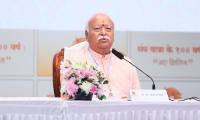It was an unusual seminar at noon on Tuesday in the New Delhi summer where Rajdeep Sardesai, Indian television's star anchor was quizzed by Sharad Yadav, former Union minister and president of Janta Dal-United.
The seminar organised by Indian Women's Press Corps was on issues related to reservation.
Yadav, who was a bit impatient, took on the TV media and alleged that the coverage of the 19-days' anti-reservation movement was biased and lopsided.
He argued that most of the media were upper caste and that was reflected in the coverage.
Yadav said anti-reservation protests had only 200 students at AIIMS, but TV coverage made it a big issue as if they were countering Indian Parliament.
Sardesai, whose channel CNN-IBN had gone overboard over the issue, stoutly defended Yadav's allegations.
He pointed out that there is a difference in the media of 1990 and 2006.
In India there are around 34 news channels providing 24/7 coverage. More than eight news channels are in Hindi and in English, three news channels are facing fierce competition.
Sardesai said in his defence that he refused to believe there was any kind of conspiracy behind the coverage of the reservation issue.
He said although there are more upper caste journalists in the Indian media, a recent survey showed that large number of journalists were Mandalites.
"On the reservation issue, there is a level of intolerance on both sides. People who are trying to seek the middle ground are finding it difficult," he said.
Sardesai tried to compare the difficulty media faced while covering the Gujarat riots when Chief Minister Narendra Modi too found the media coverage biased.
He however conceded that, "In television, persons whose voices are the loudest and who have extremes views are heard more."
Sardesai also said its limitation was that in the cacophony of news coverage in 24/7 news channels, information gets lost.
He said sometimes reporters who are covering the issue have no clue of the subject because they become reporters straight out of college. They speak without reference to context.
However Arnab Goswami of Times Now, his co-panelist, strongly disagreed with Sardesai and said an editor need not be apologetic about this, since the reporter on the field (who may be ignorant of history) provides news, and providing analysis is his job.
Sardesai, also pointed out that spokesmen of the Other Backward Classes, Scheduled Castes and Scheduled Tribes were not articulate in English, so they get lesser coverage and one should not see any conspiracy behind them getting less coverage than the people who are opposing reservation.
"You are not capable to find the middle ground. But we in media are in a better position to find the middle ground," Sardesai told Yadav.
Yadav retorted back that without taking into account 90 per cent of India, you can't build the nation.
Ram Kripal Singh of Aaj Tak candidly said that every Friday they read the TRP ratings and that does influence their decisions.
Singh revealed that when Aamir Khan had a press conference in Mumbai on the banning of Fanaa issue in Gujarat, Prime Minister Manmohan Singh was having his press conference in Kashmir and when they showed Khan, the TRP was 80 while Dr Singh had a TRP of only 10.
Singh said that television and newspapers were not the medium of self-expression. One has to cater to market's choice.
In the first session Yadav and P V Indiresan, former professor from IIT, and expert Ritu Priya debated Reservation: Twenty years from now.








